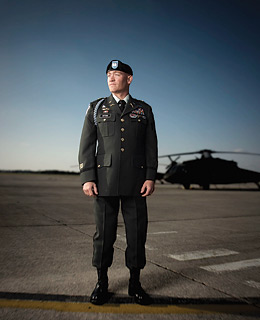
Timothy Gittins
There is a comforting ordinariness to Army Captain Timothy Gittins. Based at Fort Campbell, Ky., the 31-year-old Southern Baptist is devoted to his wife Shelley and their two sons T.J., 6, and Cole, 4. He drinks Bud Light and tries to find time to zoom around on his new Harley.
Yet history has thrust Gittins into America's hot zones in Afghanistan and Iraq. He was deployed deep in Afghanistan's Shah-i-Kot valley battling—and being wounded by—the Taliban during Operation Anaconda in 2002. And last year he was prowling the dangerous neighborhoods south of Baghdad when a G.I. under his command was killed in a nighttime ambush in a vehicle just 10 ft. away.
Although Gittins' unit is likely to return to war sometime next year, he is transferring out and will train soldiers before taking on a third combat assignment in 2009. He is an apt symbol of the heroism that the U.S.'s pair of lengthening wars have demanded of the roughly 1 million men and women who have fought them. The Army recently recognized Gittins as one of its most outstanding young officers. The highly decorated Ranger says he loves leading troops in combat. "We have liberties that we stand to lose if we aren't willing to fight for them," he says. And he insists the U.S. is making more progress in Iraq than most people realize. At the same time, he has no problem with the wars' critics and appreciates those who oppose the conflicts but still support the men and women fighting in them.
While policy is cast in the White House and hammered out in the Pentagon and Congress, it is soldiers like Gittins who influence, through grit and courage, what actually happens on the ground.